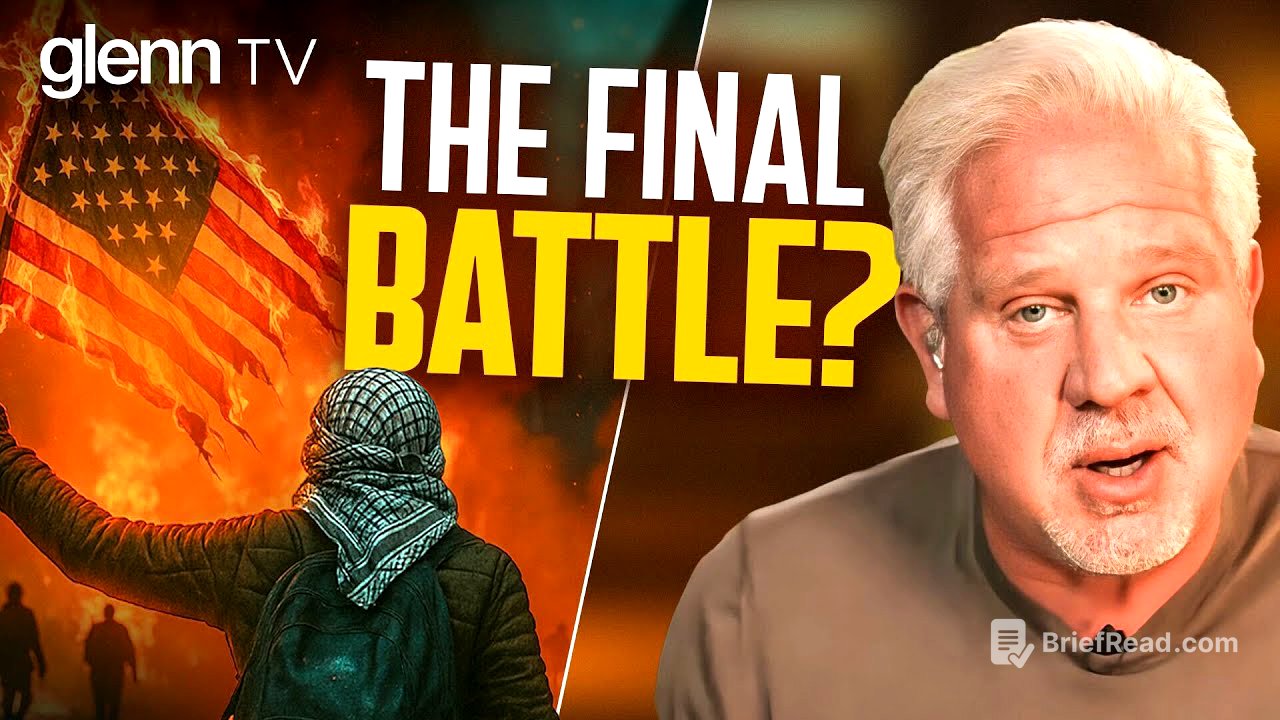TLDR;
Glenn Beck discusses the current state of the world, drawing parallels to the chaos of Gotham City and the potential for a final, biblically-significant battle. He warns about the rise of radical ideologies, both domestically and internationally, and the dangers they pose to Western civilization. The summary includes key points such as the increasing violence and extremism in American streets, the influence of foreign powers in anti-Israel movements, and the potential for a major conflict involving Iran.
- The world is heading towards a final battle, with players already on the field.
- American society is transforming into a chaotic "Gotham," marked by vigilante actions and a breakdown of law and order.
- Radical groups, including communists, anarchists, and Islamists, are uniting to undermine Western values.
- The Democratic Party's alignment with extremist organizations is empowering dangerous elements.
- The threat of war with Iran looms, potentially dividing America and destabilizing the Middle East.
Introduction: The World at a Crossroads [0:07]
Glenn Beck opens by expressing concern over the current global situation, which he believes is reminiscent of a time Ronald Reagan warned about, where all solutions are bad. He notes a consistent message of "death to the West, death to America" from various radical groups, from rioters in Los Angeles to Islamic clerics in Iran. Beck argues that some people simply want to watch the world burn, and their actions are pushing society towards a cartoonish, chaotic state.
The Descent into Gotham [1:54]
Beck uses the image of Gotham City from Batman to illustrate the deteriorating state of American society. He points to increasing vigilante actions and a breakdown of law and order, turning the nation into a civilization of "vigilante gogets." Beck highlights recent incidents, such as the shooting at a "No Kings" rally in Salt Lake City and the assassination of a Minnesota politician, as signs of this descent into chaos. He emphasizes that these are not isolated incidents but part of a larger trend of extremism and violence.
The Rise of Radicalism and Political Complicity [5:52]
Beck notes that the violence is not random but often targets those who are not left-wing enough. He questions why prominent Democrats are not speaking out against the violence, suggesting they may be afraid or complicit. Beck argues that politicians have lost control and are now goading the citizens of Gotham City. He recalls past warnings about the media and politicians manipulating people, leading them down a dark path.
Interview with Ozra Nomani: Unmasking the Forces Behind the Chaos [16:45]
Glenn Beck interviews journalist Ozra Nomani, who shares her firsthand observations from a "No Kings" demonstration in Philadelphia. Nomani describes seeing a stage managed by a web of organizations, including the American Federation for Teachers, rallying people against Donald Trump. She emphasizes the nexus between Democratic organizations and more extreme groups, including Islamist sympathizers and socialist, Marxist, and communist factions. Nomani recounts encountering chants of "long live the intifada" and "globalize the intifada," the same chants used by a man who murdered Israeli embassy staffers. She warns that these radicals are gaining influence and will eventually target even the politicians who enable them.
The Looming Conflict with Iran [30:40]
Beck shifts focus to the potential for war between Israel and Iran, which he believes is dividing America. He expresses his desire to avoid another war but acknowledges the threats posed by the Islamic regime in Iran. Beck highlights Iran's history of hostility towards the United States and Israel, its support for terrorist groups, and its pursuit of nuclear weapons. He quotes Alexander Solzhenitsyn on the importance of standing up against lies and encourages listeners to recognize the truths about the threats facing the West.
Interview with Nick Kosar: An Iranian Dissident's Perspective [41:13]
Glenn Beck interviews Nick Kosar, an Iranian journalist and cartoonist who was forced to flee Iran after being threatened for his political cartoons. Kosar expresses skepticism about the possibility of imposing democracy through military intervention, citing the failures in Iraq and Afghanistan. He laments the lack of a united opposition in Iran and the selfishness of Iranian politicians. Kosar emphasizes the need for Iranian leaders to prioritize their country and learn from the principles of the U.S. Constitution. He urges the U.S. and Israel to listen to the voices of Iranians who love all three countries and seek a peaceful, democratic future for Iran.









